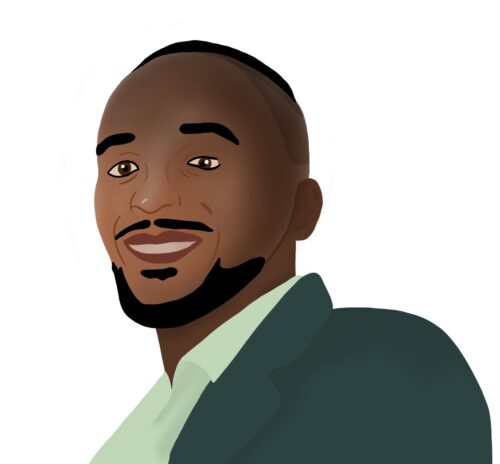Art courtesy of Ellie Gabriel.
Ten minutes into my conversation with Dr. C. Brandon Ogbunu (PhD ’10), I knew that no 750-word profile could fully do him justice. Throughout his life, Ogbunu has consistently pushed boundaries and rejected dichotomy, making for an impressive career that resists abridgement. Ogbunu is a scientist, yes, but he is also a prolific writer, storyteller, and educator. His nontraditional, interdisciplinary path has led him to the Ecology & Evolutionary Biology Department at Yale, where he is an assistant professor and the principal investigator for the Ogbunu Lab for Genetics, Ecology, Evolution, and Quantitative Science (GEEQs) research.
Despite being a self-described “late bloomer” academically, Ogbunu emphasizes that he has always harbored a deep love of learning. He credits his mother, a teacher, with imparting to him this proclivity for scholarship, which blossomed during his undergraduate years at Howard University. There, Ogbunu studied chemistry, explored the intersections between various scientific disciplines, and developed an interest in disease. After graduating from Howard in 2002, Ogbunu studied malaria in Kenya on a Fulbright scholarship, an experience that confirmed his preference for research over clinical practice. “It was when I got to Kenya that I said, if I can be doing this kind of work as a grown-up, this is the career that I want: the producing and engaging of scholarship,” Ogbunu said. “Science is a type of scholarship; it’s a manner through which a person creates knowledge and offers it to the world.”
Upon returning to the US, Ogbunu followed his curiosity to Yale, where he worked in Paul Turner’s virology lab. He completed his PhD in microbiology in 2010 and, subsequently, a postdoctoral fellowship at Harvard. Ogbunu spent two years working at Brown University before returning to Yale in the fall of 2020, this time as a faculty member.
Ogbunu, a computational biologist trained in chemistry, mathematics, genetics, evolution, and microbiology, approaches research in a way that reflects the diversity of his interests and abilities. His GEEQs lab conducts “remix science,” drawing on concepts from various scientific fields to gain insight into disease. Ogbunu considers research questions on two levels: the molecular scale, comprising technical knowledge of genetics and biology, and the population scale, involving modeling and data analysis. Together, they have brought him great success and an enduring love for his work. “[The multidisciplinary approach] is just more fun—I can talk to more people, I can engage more people,” Ogbunu said. “On one end, these two lenses allow me to comment on and think about very practical things. On the other, they let me ask broad questions about society or evolution or ecology.”
Ogbunu is a staunch believer in the importance of collaboration. Throughout our discussion, Ogbunu was quick to credit the positive influences that others, particularly his mother, his college friends, and Turner, have had on his life and career. When asked how his passion for community informs his approach to teaching, Ogbunu described the ability to craft an engaging and supportive lab environment as an incredibly exciting aspect of being a principal investigator. “I do a self-care symposium in my lab, where every year you have to present on the ways you’re going to take care of yourself, and answer questions,” Ogbunu said. “I can work my value system into the ways my lab interacts.”
Consistent with his lifelong love of learning and creating scholarship, Ogbunu is also an impressive communicator, having written numerous blog posts, contributed to WIRED, and appeared on podcasts. “I’ve always been connected to writing—I’ve read comics all my life. Writing and art and being creative have always been a part of my identity,” he said. Rather than seeing his creative pursuits as separate from his dedication to science, Ogbunu considers his writing, his scientific process, and his teaching to be complementary. Through his writing, Ogbunu skillfully explores questions at the intersection of science and society: the limitations of analogizing infectious disease and white nationalism, the potential of network science to make sense of our increasingly interconnected world, and the insidiousness of scientific racism and the legacy of James Watson. Moreover, he presents his thoughts on these complex and technical topics in ways accessible to the average reader.
Ogbunu’s success serves as a reassuring reminder to my fellow students, anxious over seemingly binary decisions between disciplines and unsure of how to appropriately navigate the professional world. Prioritizing a dedication to one’s values—in Ogbunu’s case: community, scholarship, and creativity—over an adherence to previously-trodden paths is not only possible, but highly rewarding.

